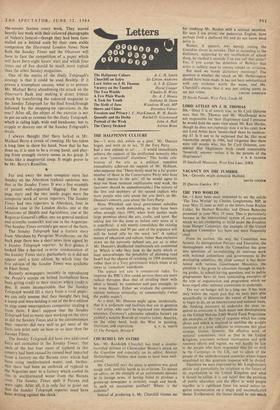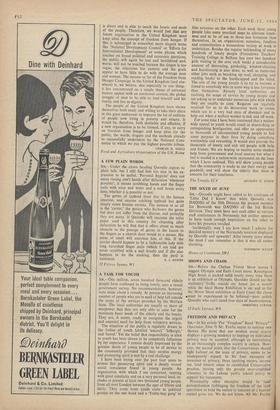THE TWO WORLDS
SIR,—I have been' most interested to sec the article 'The Two Worlds' by Charles Longbottom, MP, in your May 22 issue as well as the letters from Ritchie Calder, Sir Herbert Broadley and Olwen Battersby presented in your May 29 issue. This is particularly because in the international system of co-operation which we are attempting to build under the Freedom from Hunger Campaign, the example of, the United Kingdom Committee has been one most frequently cited.
From its earliest, the way the Committee was formed, its distinguished Patrons and Executive, the thoroughness with which the Committee has gone into questions of co-ordinating its overseas work with national committees and governments in the developing countries, the, close contact it has main- tained with various Government Ministries, the attention it has given to education through its teach- ing guides, its school-leaving questions, and its public programmes have all been outstanding examples of the type of organisation and programme which we have urged other national committees to undertake.
The war on hunger will be a long one. It has been only within the recent past that we have been able scientifically to determine the extent of hunger and to begin to do, on an international and national basis, the thinking necessary to 'undertake the steps re- quired to overcome it. Such major new developments aS the United Nations F,AO World Food Programme ate examples.of the type of response which has come about and which is reqaired to mobilise the world's resources at a level sufficient to overcome this great scourge. Unless, however, the effective work of national committees, such as that in the United Kingdom, continues without interruption and with renewed efforts and vigour, we will hardly be fair to the people who have responded thus far so well to the Campaign in the UK, not to speak of the people of the underdeveloped countries whose hopes stimulated by this generous response will be denied.
Therefore we were impressed by Mr. Longbottom's article and particularly his reference to the future of an organisation in the United Kingdom and what it should be called. It is our belief that the problem of, public education and the effort to weld people together in" a significant force for social action re- quires concentration on a single and uncomplicted theme. Furthermore, the theme' should be One which is direct and is able to touch the hearts and souls of the people. Therefore, we would feel that any future organisation in the United Kingdom must keep alive the concept of freedom from hunger. If this is submerged in somewhat more elegant terms like 'National Development Council' or 'Efforts for International Development' or some phrase which touches on broad political and economic questions,
the public will again be lost and bewildered and, worse, will not be touched because the slogan is too vague, the objectives too esoteric and the goals appear to have little to do with the average man and woman. The success so far of the Freedom from -Hunger Campaign in the United Kingdom (and else- where) is, we believe, due especially to one thing: it has concentrated on a simple theme of universal human appeal with an emotional content, the global struggle of man to be able to feed himself and his family and live in dignity.
The people of the United Kingdom have shown themselves both ready and willing to take their share in this great endeavour to improve the lot of millions of people now living in poverty and misery. It would be, therefore, both desirable and effective, if a new organisation is to be formed, if any, to carry on freedom from hunger and keep alive for the public, the words, slogans and the methods already. so successfully undertaken by the National Com- mittee to which we pay the highest possible tribute.



































 Previous page
Previous page